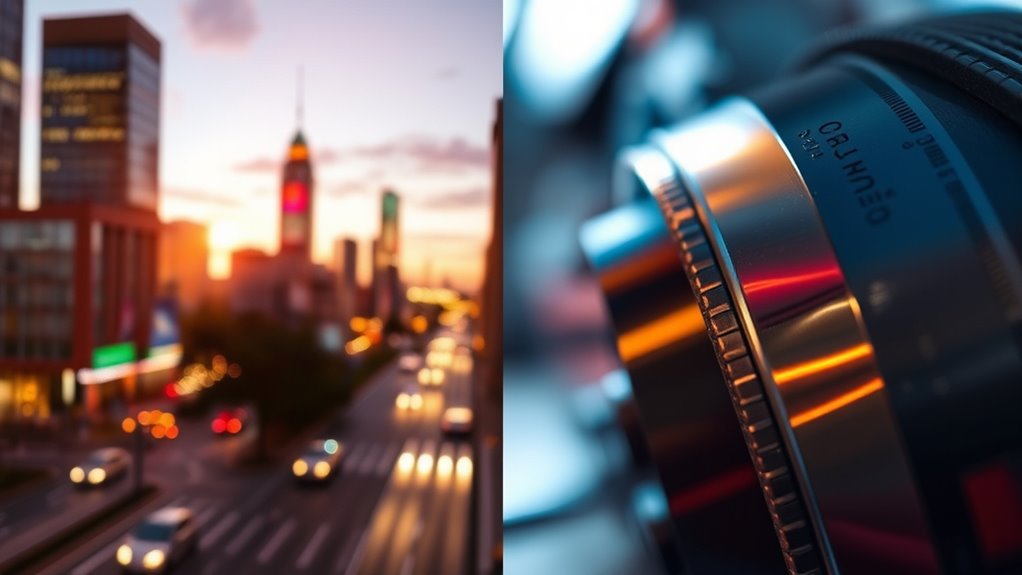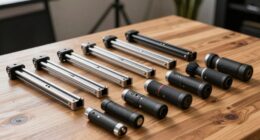To master paper versus metal filters in 7 days, start by understanding their differences: paper filters give a cleaner, brighter brew by trapping grounds and oils, while metal filters let more oils through, creating a fuller-bodied flavor. Consider your taste—favor clarity or richness—and your maintenance routine. Experiment with both to notice taste and texture changes. Keep practicing, and you’ll discover how each filter enhances your coffee; continuing will reveal even more expert tips.
Key Takeaways
- Understand how paper filters produce a cleaner brew, while metal filters offer a fuller-bodied, oil-rich coffee.
- Practice switching between filters to experience flavor and clarity differences firsthand over 7 days.
- Learn proper maintenance techniques for both filter types to ensure optimal performance and longevity.
- Adjust brewing parameters and temperatures to see how filter material influences taste and texture.
- Incorporate personal taste preferences to select the ideal filter for your desired coffee profile and routine.
Understanding the Basics: What Are Paper and Metal Filters?
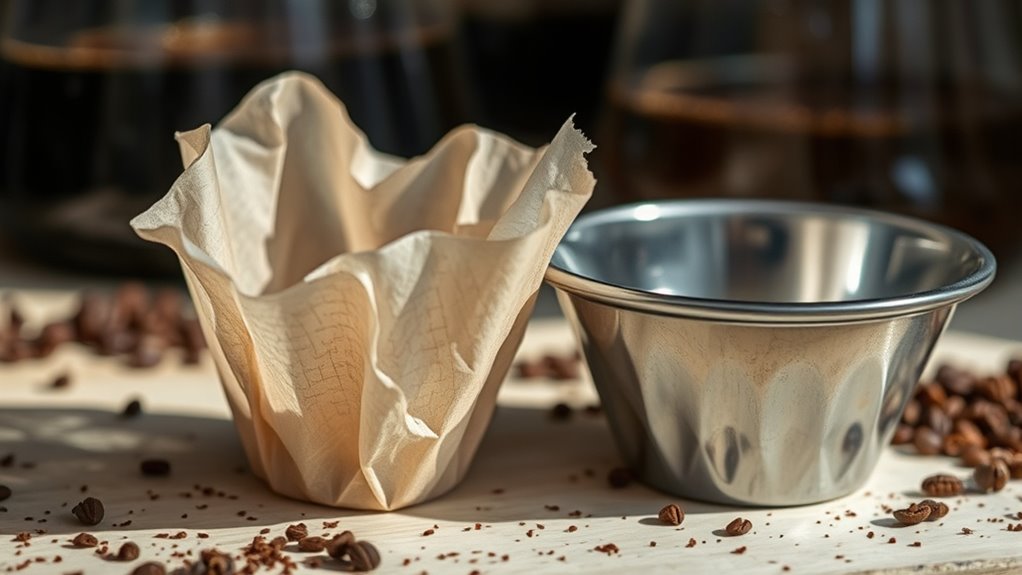
To understand the differences between paper and metal filters, it’s important to know what they are and how they work. Filter material is the core component that determines how each filter functions. Paper filters are made from thin, porous paper designed to trap coffee grounds while allowing liquid to pass through smoothly. They are disposable and typically used with pour-over brewing equipment. Metal filters, on the other hand, use fine mesh or perforated metal that can be cleaned and reused. They offer a different filtration process, often allowing more oils and fine particles to pass through. Both types fit various brewing equipment, but their construction impacts how they influence your brewing process. Knowing the materials helps you select the right filter for your preferred coffee style. Additionally, understanding filter maintenance is crucial for ensuring optimal performance and longevity of your chosen filter type.
The Brewing Impact: How Filters Influence Flavor and Clarity
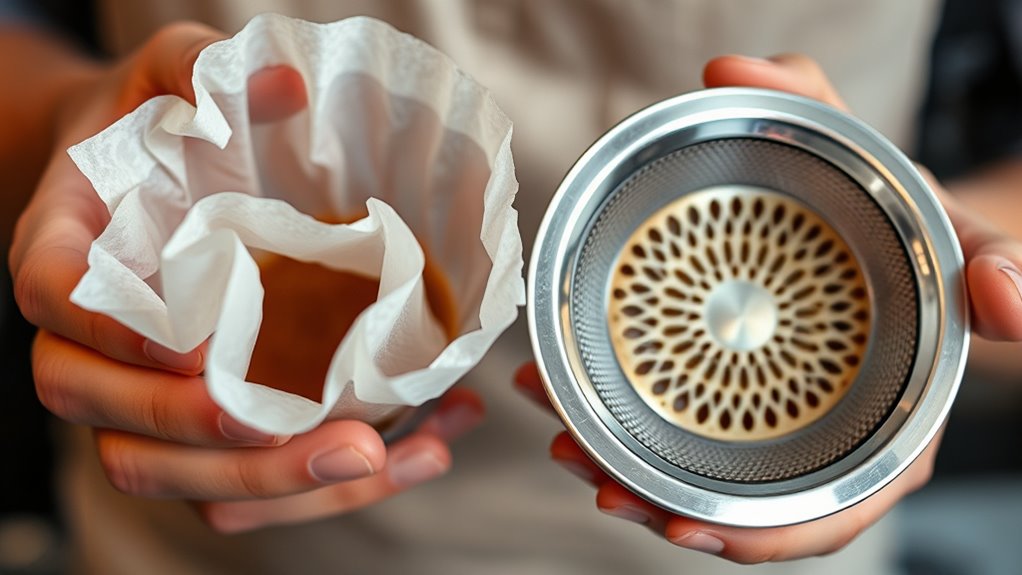
The type of filter you choose directly impacts the flavor and clarity of your coffee. Filter material, whether paper or metal, influences how oils and fine particles pass through, shaping the drink’s texture and taste. Paper filters tend to trap more oils and sediment, resulting in a cleaner, brighter flavor profile and clearer brew. Metal filters allow more oils and tiny particles to pass, enhancing body and richness but possibly reducing clarity. Brewing temperature also plays a role; higher temperatures can extract more flavors but may highlight differences caused by filter material. For example, a metal filter’s impact on flavor becomes more noticeable at elevated temperatures, while paper filters maintain a consistent clarity. Your choice of filter material and brewing temperature together determine the final taste and appearance of your coffee. Additionally, understanding home improvement principles can help you optimize your brewing setup for better consistency and efficiency.
Pros and Cons: Evaluating the Advantages and Disadvantages of Each Filter Type

Choosing between paper and metal filters involves weighing their distinct advantages and disadvantages. Paper filters excel at filter filtration, trapping fine particles and oils, which results in a clean, crisp brew clarity. They’re simple to use and disposable, making cleanup quick. However, they can absorb some essential oils, slightly dulling flavor and requiring more paper filters over time. Metal filters, on the other hand, promote better filter filtration by allowing more oils and micro-grounds through, which can enhance body and depth. They’re durable, reusable, and eco-friendly, but may let finer particles slip through, leading to less brew clarity. They also require thorough cleaning to prevent clogging. Your choice depends on whether you prioritize a cleaner cup or richer flavor with more body. Additionally, filter material plays a significant role in determining the overall brewing experience and outcome.
Choosing the Right Filter for Your Style: Factors to Consider
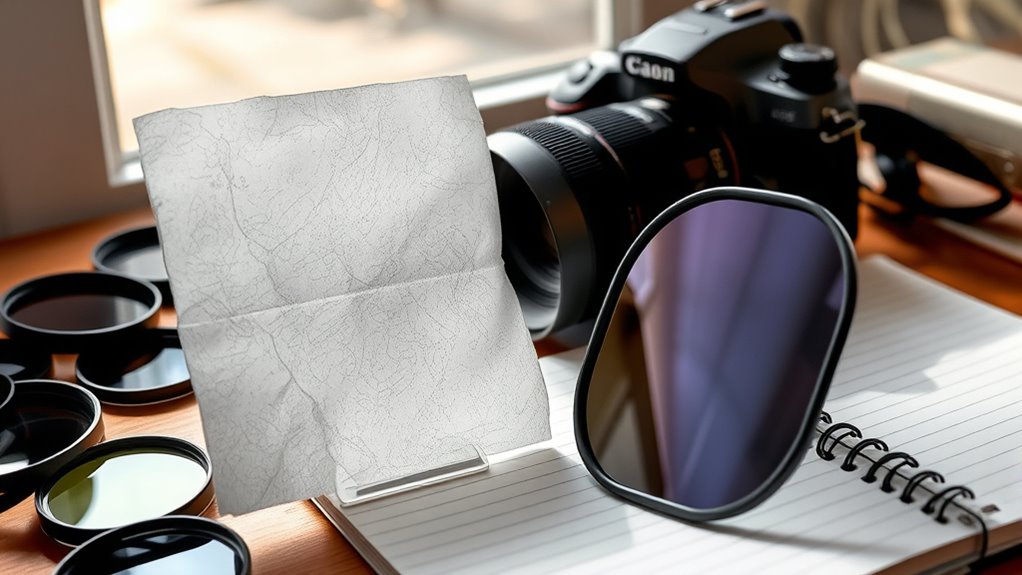
Selecting the right filter depends on your personal taste and brewing priorities. Consider the filter material—paper filters provide a clean, crisp cup by trapping oils and sediment, while metal filters allow more oils through, enhancing flavor complexity. Your preferred taste profile influences this choice. Additionally, filter size matters; larger filters can handle more coffee, making them ideal for brewing multiple cups at once, whereas smaller filters suit single servings. Think about your routine—if you value convenience and quick cleanup, paper filters might be better. If you want richer, fuller-bodied coffee and don’t mind extra maintenance, metal filters could be the way to go. Ultimately, aligning filter material and size with your brewing style ensures a satisfying coffee experience tailored to your preferences. Incorporating sound healing science techniques into your routine can also enhance your overall brewing experience by promoting relaxation and mindfulness.
Practical Tips: Maintenance and Longevity of Your Filters
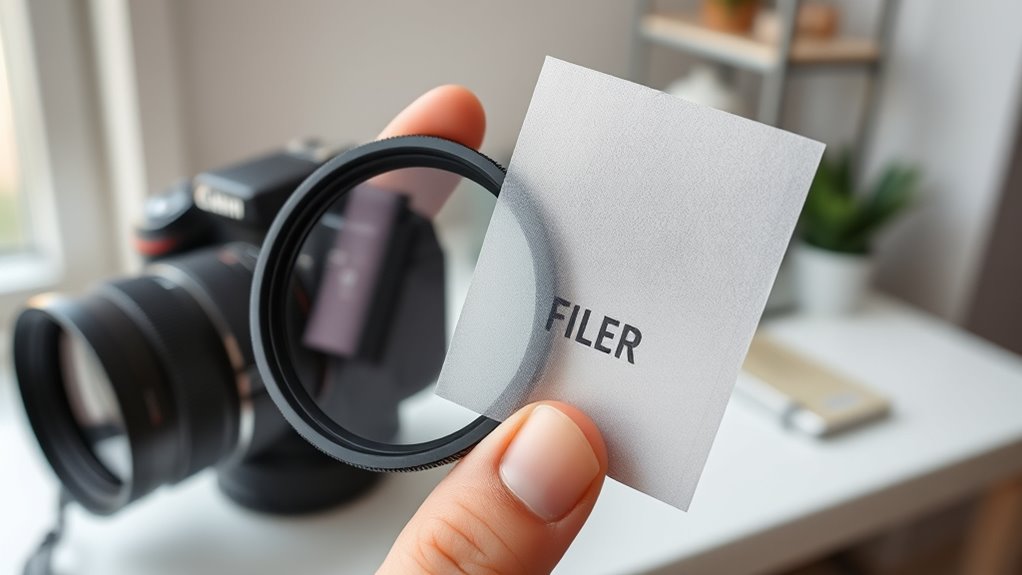
Maintaining your filters properly is essential to guarantee consistent coffee quality and extend their lifespan. Regular cleaning prevents buildup of oils and residues that can affect flavor. For paper filters, simply dispose of used filters and replace them with new ones after each brew. Metal filters, on the other hand, require more thorough cleaning techniques—rinsing under hot water, using a soft brush to remove trapped particles, and occasionally soaking in vinegar or a descaling solution. Avoid harsh abrasives to prevent damage. Keep an eye on wear and tear; if your metal filter shows signs of damage or corrosion, consider filter replacement to maintain peak performance. Proper maintenance ensures your filters continue to perform well and deliver the best possible coffee each time. Additionally, using a vetted home theatre projector can enhance your overall coffee and viewing experience at home.
Experimenting and Refining: Tasting Differences and Perfecting Your Brew
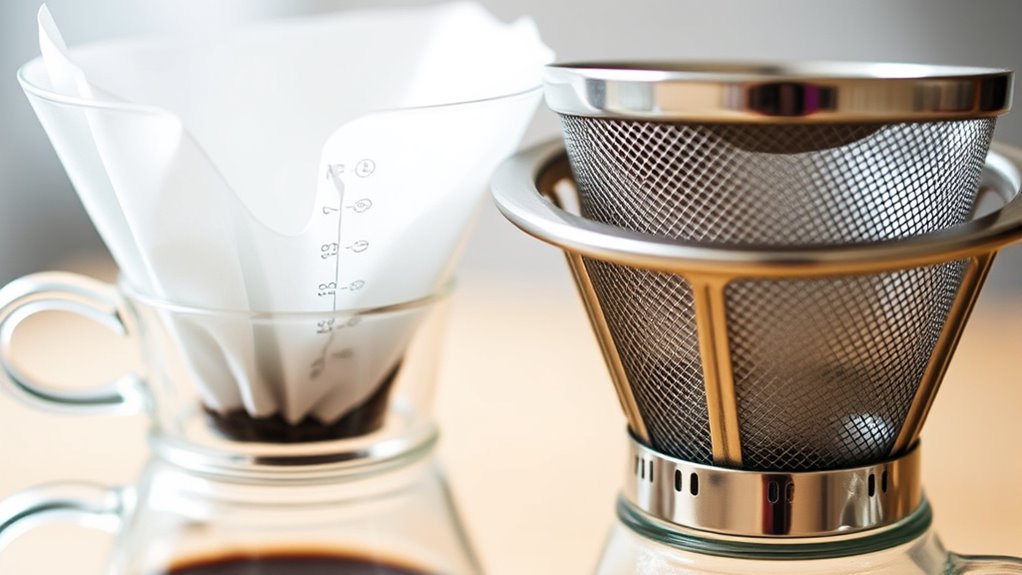
Have you ever noticed how small adjustments in your brewing process can dramatically change the flavor of your coffee? Experimenting with different filters helps you discover their unique impact on taste. Metal filters offer filter versatility, allowing more oils and fine particles through, which can enhance richness. Paper filters, on the other hand, produce a cleaner, more consistent flavor. By tasting differences between brews, you learn how variables like grind size, water temperature, and filter type interact. Refining your technique involves tracking these changes to achieve brewing consistency. Keep notes on your experiments, so you remember what works best. Over time, this process sharpens your palate and helps you craft the perfect cup, whether you prefer the full-bodied depth of a metal filter or the clarity of paper. Additionally, understanding the material composition of filters can help you select the best option for your desired flavor profile.
Becoming a Filter Expert: Making Informed Decisions for Every Cup
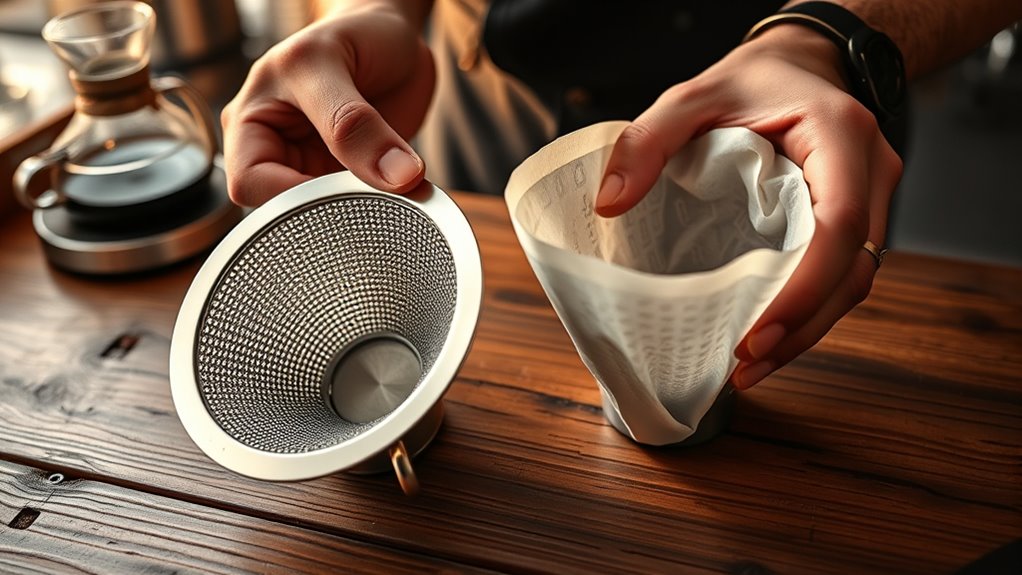
Understanding the strengths and limitations of different filters is key to making informed choices that enhance your coffee experience. Your choice of filter material affects extraction and flavor, so consider how it pairs with your preferred brewing techniques. To become a filter expert, focus on these aspects:
- Filter material: Decide between paper or metal based on how they influence taste and cleanup.
- Brewing techniques: Adjust your methods to optimize extraction with each filter type.
- Taste preferences: Recognize how the filter material impacts clarity, body, and flavor nuances.
- Being aware of filter performance can help you select the best option for your brewing style.
Frequently Asked Questions
Can Paper or Metal Filters Be Used Interchangeably?
You can’t really use paper and metal filters interchangeably because they affect filter longevity and flavor retention differently. Paper filters tend to block more oils, providing a cleaner taste but may need replacing more often. Metal filters last longer and allow more oils through, enhancing flavor but requiring regular cleaning. Choose based on your preference for flavor retention and how often you want to replace or clean your filter.
How Does Filter Material Affect Brewing Speed?
They say, “Speed isn’t everything,” but in brewing, filter material definitely impacts brewing speed. A paper filter with high permeability allows water to pass through quickly, speeding up the process. Metal filters, with lower permeability, slow things down but often enhance brewing consistency by providing a more controlled flow. Your choice depends on whether you prioritize faster brewing or consistent results, but remember, patience often yields the best flavor.
Are There Environmental Impacts Between Paper and Metal Filters?
You should consider the environmental impacts of paper and metal filters by examining sustainability considerations and recyclability options. Paper filters are biodegradable and often made from sustainable resources, but they generate waste that needs disposal. Metal filters are reusable, reducing waste over time, and are recyclable in many areas. Choosing a metal filter supports sustainability, while paper filters offer convenience but contribute to landfill waste.
What Are Common Troubleshooting Issues With Each Filter Type?
Like a song with a tricky beat, troubleshooting your filters can be frustrating. With paper filters, clogging occurs when grounds build up, requiring regular cleaning or replacement. Metal filters, on the other hand, face durability concerns if they bend or warp over time. To keep them performing, guarantee proper cleaning and handle them carefully. Addressing these issues promptly keeps your brewing smooth and your equipment lasting longer.
How Do Filters Influence the Temperature Stability of Brewed Coffee?
Filters play a key role in your coffee’s temperature stability and brew consistency. Metal filters typically allow more heat transfer, helping maintain a stable filter temperature, which results in more consistent extraction. Paper filters, however, can insulate the brew, causing temperature drops that may lead to uneven extraction. By choosing the right filter, you guarantee your coffee stays at ideal temperature, delivering a balanced and flavorful brew every time.
Conclusion
Now that you’ve mastered the magic of paper and metal filters, you’re ready to refine your brew with confidence. By understanding their differences, deciding with discernment, and dedicating time to testing, you’ll develop a delightful, distinct drink every time. Whether you prefer the purity of paper or the resilience of metal, your brewing journey is about discovery and dedication. Plunge in, experiment eagerly, and enjoy every exceptional sip along the way!
